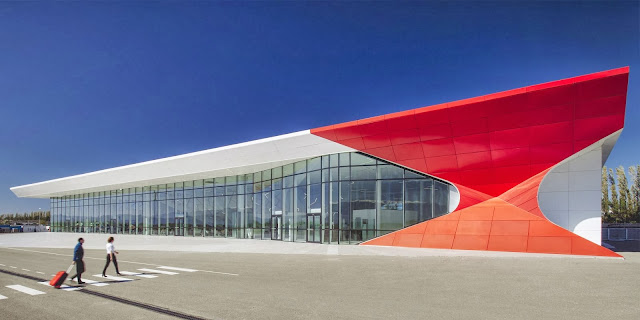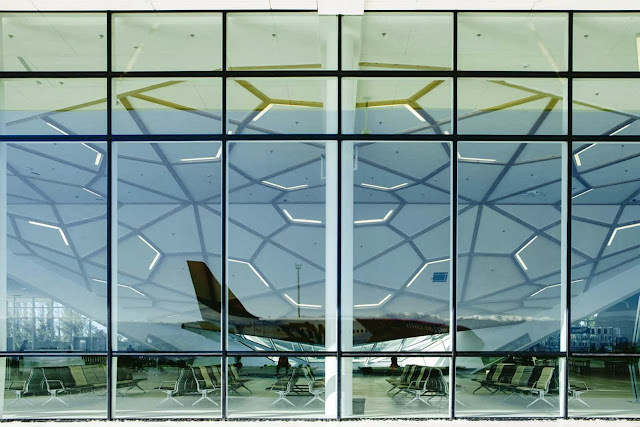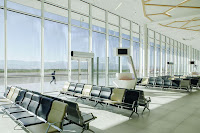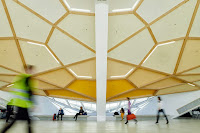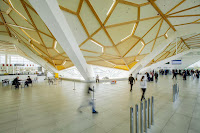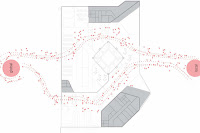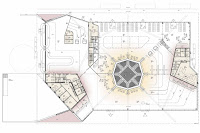The new Kutaisi 'King David the Builder' International Airport - which serves domestic and international flights for use by tourists, national politicians and international diplomats - incorporates both Georgia’s historic landscape and its architecture.
The architecture of the terminal refers to a pavilion; a gateway, in which a clear structural layout creates an all-encompassing and protective volume. The volume is structured around a central exterior space which is used for departing passengers.
The transparent space around this central point is designed to ensure that flows of passengers are smooth and that departure and arrival flows do not coincide.
Both the exterior corner detail and the so called 'umbrella' structure within the terminal building – which operates as a roundabout for passenger flows - operate as the two main architectural details around which all of the airport functions are organised.
UNStudio’s design comprises the full airport development, including a revision of the runway, the master plan for the landscape and planned future development thereof, the terminal building, offices, a meteorological station and the air traffic control tower.
The 55m high Air Traffic Control Tower and its supporting office/operational building is designed to complement the design of the terminal. The traffic control cabin on the top level forms the focal point of the tower, with a 360 degrees view on the surrounding landscape.
A spacious and comfortable interior ensures a workspace for 4-8 operators with optimal concentration. The exterior of the tower is clad with a perforated skin on a concrete core to use wind for ventilation purposes.
LED Light in-between the skin and the core enhance the beacon effect of the tower at dusk and dawn by changing colour whenever there is a fluctuation in wind speed.
Ben van Berkel: "The design for the new airport embraces the traveller by embodying the circumstance of the site. Moments of both leaving and returning are celebrated by the large span, open spaces and high ceiling of the terminal structure - reflecting the ways in which such gestures were employed in the great railway stations of the past."
Location: Kutaisi, Georgia
Architects: UNStudio
Project Team: Ben van Berkel, Caroline Bos, Gerard Loozekoot with Frans van Vuure and Filippo Lodi, Roman Kristesiashvili, Tina Kortmann, Wendy van der Knijff, Kristoph Nowak, Machiel Wafelbakker, Gustav Fagerström, Thomas Harms, Deepak Jawahar, Nils Saprovskis, Patrik Noome
Structural consultant: MTM kft.
MEP consultant: SMG-SISU kft.
Landscape: OR else
Airport planning: Arup Aviation
Sustainability: Arup
Terminal advisor on interior & art: Inside Outside / Petra Blaisse
Light: Primo Exposures
Local architect: Studio ARCI
Acoustics: SCENA akoestisch adviseurs
Wind-testing: Peutz
Cost and management: Davis Langdon
Visualisation: Moka Studio
Building surface: terminal 4,500 m2, Control Tower and offices 1,800 m2
Building site: 12,000 m2
Year: 2013
Client: United Airports of Georgia
Photographer: Nakaniamasakhlisi, Tbilisi
Architects: UNStudio
Project Team: Ben van Berkel, Caroline Bos, Gerard Loozekoot with Frans van Vuure and Filippo Lodi, Roman Kristesiashvili, Tina Kortmann, Wendy van der Knijff, Kristoph Nowak, Machiel Wafelbakker, Gustav Fagerström, Thomas Harms, Deepak Jawahar, Nils Saprovskis, Patrik Noome
Structural consultant: MTM kft.
MEP consultant: SMG-SISU kft.
Landscape: OR else
Airport planning: Arup Aviation
Sustainability: Arup
Terminal advisor on interior & art: Inside Outside / Petra Blaisse
Light: Primo Exposures
Local architect: Studio ARCI
Acoustics: SCENA akoestisch adviseurs
Wind-testing: Peutz
Cost and management: Davis Langdon
Visualisation: Moka Studio
Building surface: terminal 4,500 m2, Control Tower and offices 1,800 m2
Building site: 12,000 m2
Year: 2013
Client: United Airports of Georgia
Photographer: Nakaniamasakhlisi, Tbilisi

